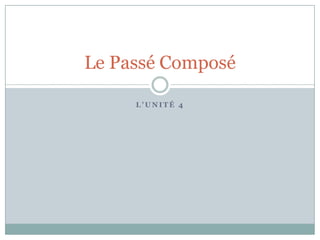
Le passé composé
- 1. Le Passé Composé L’UNITÉ 4
- 2. Aujourd'hui et hier Aujourd’hui hier Je parle français. J'ai parlé français. Je nage dans la piscine. J'ai nagé dans la piscine. Tu chantes beaucoup. Tu as beaucoup chanté. Tu danses bien. Tu as bien dansé. Elle prépare le dîner. Elle a préparé le dîner. Il visite Paris. Il a visité Paris. Nous parlons anglais. Nous avons parlé anglais. Nous étudions. Nous avons étudié. Vous voyagez en Europe. Vous avez voyagé en Europe. Vous portez la parapluie. Vous avez porté le parapluie. Ils mangent beaucoup. Ils ont beaucoup mangé. Elles écoutent la musique. Elles ont écouté la musique.
- 3. Le passé composé This is called the passé composé, or a past tense in French. As the name implies, it is a "composed past" tense--it is composed of two parts. 1) a present tense form of "avoir"; and 2) a past participle.
- 4. Avoir J’ai nous avons Tu as vous avez Il/elle a ils/elles ont
- 5. Past participles- er verbs Step 2: Form the past participle: For -er verbs, drop the -er and add -é. The word sounds the same as the infinitive. Nager- nagé manger- mangé Parler- parlé voyager- voyagé Danser- dansé donner- donné
- 6. Past participles- -ir verbs Step 2:For -ir verbs, drop the -ir and add, -i. finir fini choisir choisi maigrir maigri grossir grossi réussir réussi
- 7. Past participles- re verbs Step 2:For -re verbs, drop the -re and add, -u: vendre vendu rendre rendu attendre attendu entendre entendu
- 8. Irregular past participles Être- été Avoir- eu Faire- fait Mettre- mis Voir- vu Boire- bu
- 9. Putting it together. Remember, the passé composé needs both the CONJUGATED VERB (Avoir, usually) and the PAST PARTICIPLE Yesterday, I ate pizza. Hier, j’ai mangé la pizza. You finished the book. Tu as fini le livre. He traveled to Paris. Il a voyagé à Paris. She succeeded. Elle a réussi. We spoke. Nous avons parlé. You all drank cokes. Vous avez bu des coca- colas. They sold the house. Ils ont vendu la maison.